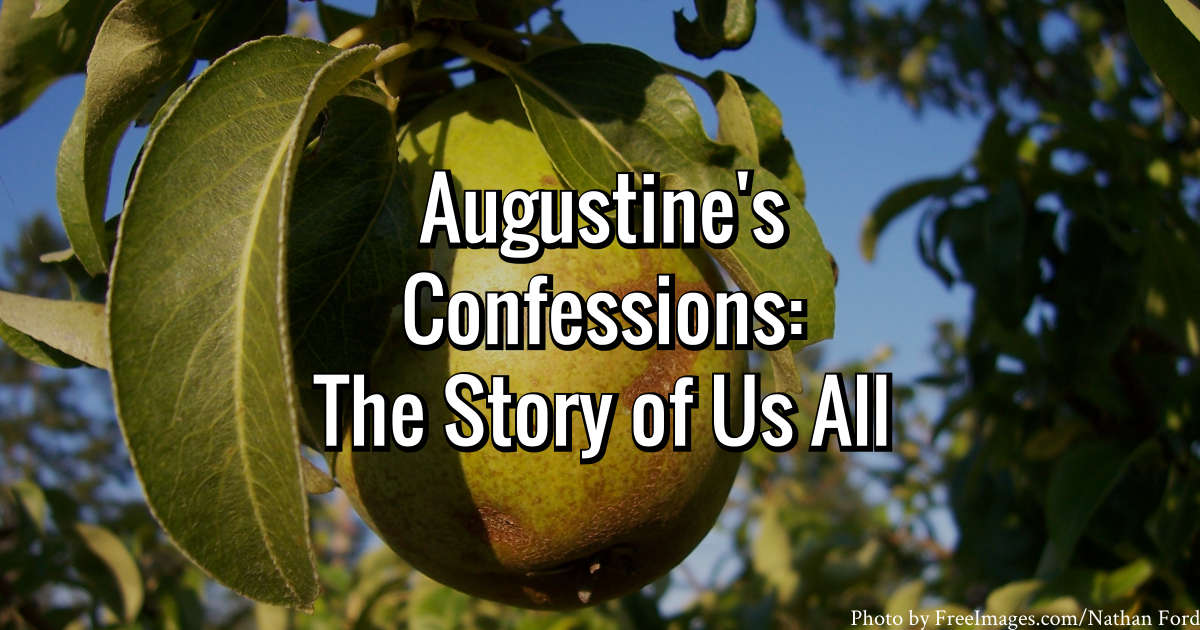C. C. I. Fenn is a guest blogger from Thoughts from Canaan. His blog can be found here.
You might think that humanity has changed a lot over the past 2,000 years. And I suppose in some ways it has. But when you get right down to it, people are people. Always have been, always will be.
And if you’re in doubt, just read the first memoir ever written: St. Augustine’s Confessions.
Though first penned over a millennia and a half ago, Confessions is just as relevant today as it ever was. Augustine deals with the same issues and struggles we all do. And as I read, I was reminded again and again of how stable the human condition is.
This isn’t to say that Augustine’s story sounds like it could’ve happened in modern America. The cultural distance between North Africa in the fifth century and the Western world of the twenty-first century is great.
Augustine discusses philosophic and religious ideas that the average American won’t ever encounter (I mean, when was the last time you met a Manichee?). He has relationships and conversations that will sound peculiar to modern ears (when he and his dad are in a public bath and his dad notice he is…ahem…reaching puberty, he gets excited about potential grandchildren. Augustine is 16 at the time).
But so much of what Augustine writes mirrors our own lives.
Illegitimate children? Check.
Violent entertainment? Check.
Political maneuvering? Check.
So even though the form these things take may be foreign, the reality beneath is very modern. It’s because of this that I can say Confessions is the story of us all.
Who hasn’t struggled with the problem of evil? Or felt the sting of a broken relationship? Who hasn’t gone through life without grieving? Or rejoicing? Without searching for truth or meaning in life?
These are the things we read about in Augustine’s story. And as we read them there, we’re compelled to see our own journeys in light of his.
For example, as he reflects on one particular sin (stealing some pears from a neighbor’s tree), he delves into the reasons underlying his wrong doing. He digs deeper than I ever have:
“With regard to my theft, then: what did I love in it, and in what sense did I imitate my Lord, even if only with vicious perversity? …Was I, in truth a prisoner, trying to simulate a crippled sort of freedom, attempting a shady parody of omnipotence by getting away with something forbidden?”
What a thought he has here! That we, in our sin, are fools “attempting a shady parody of omnipotence.” I can’t help but think about the sins that filled my own past. And when I think of them, I see exactly what Augustine is talking about. Every time I used my words to hurt rather than heal – every time I used others for my own advantage – what was I doing but stretching for godhood. Like a little boy who puts on his daddy’s tie and trots around the house with an empty briefcase, my sins were my way of saying “I’m a big boy. I can be just like Dad.”
“No one can tell me what to do,” I might’ve said. “Not even God.”
I was my own god.
But that’s how sin works. It’s the declaration of independence from a good, faithful, and gracious Father.
And so, as we read his Confessions, Augustine prompts us to look deeply into the well of our own hearts. Not simply to stare at ourselves like some modern Narcissus (or one of his off-spring). But in hope that God’s Spirit is stirring the waters.
Drawing us; purifying us; preparing us – all for Him.
Whether we realize it or not, this is what life is about: living into God’s call. Augustine’s prayer in the opening of his memoir couldn’t be truer: “You arouse us so that praising you may bring us joy, because you have made us and drawn us to yourself, and our heart is unquiet until it rests in you.”
Though I may not agree with all of Augustine’s theology (and I don’t), I can’t help but appreciate his journey. And – even more than that – the candor with which he recounts it. It’s a great reminder that even as the world around us changes, humanity remains largely the same. We love and fight, worship and politic. But whether we were born in the first century or the twenty-first century, we have the same problem (sin) and the same solution (Christ).
Reading Augustine’s Confessions will remind you of that fact and call you to reflect on your own journey.
May we continue down the well-worn path trodden by those who have gone before – including St. Augustine.
C. C. I. Fenn is a guest blogger from Thoughts from Canaan. Thoughts from Canaan is a blog, podcast, and community that helps its readers experience spiritual growth through knowledge and grace. His blog can be found here.



One thought on “Augustine’s Confessions: The Story of Us All”